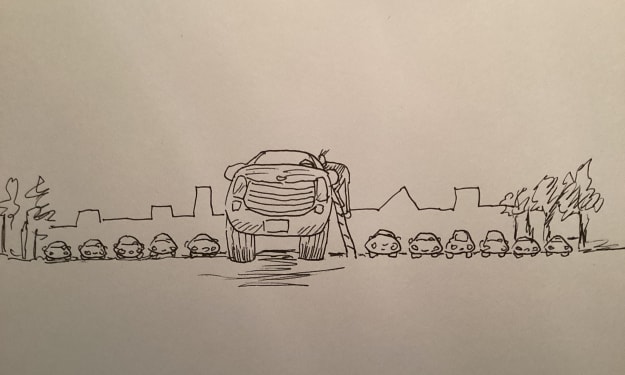A Hidden Confession: Unveiling Secrets from the Year 1900
Unearthing the Past to Shape a Future of Redemption and Unity

Introduction:
Once upon a time in the year 1900, in the picturesque town of Oakwood nestled in the countryside, a series of events unfolded, forever changing the lives of its inhabitants. The town, known for its tight-knit community and idyllic charm, was unaware that a profound secret lay dormant, waiting to be unveiled.
One autumn morning, as the leaves turned fiery hues and the air grew crisp, the townspeople gathered in the local church for their weekly service. The sun's gentle rays streamed through the stained glass windows, casting a colorful mosaic upon the faces of the congregation. Among them sat an elderly gentleman named Samuel, his weathered hands clasped tightly together, his expression burdened by a weight invisible to others.
As the hymns reverberated through the hallowed space, Samuel felt an ever-growing unease within his heart. The weight of his secret had become unbearable, haunting his every waking moment. For decades, he had concealed a truth that possessed the power to shatter the very foundations of Oakwood's peaceful existence.
Driven by an indomitable urge to unburden his soul, Samuel stood up during the pastor's sermon, his voice trembling with a mixture of fear and determination. The once-bustling church fell into a hushed silence as all eyes turned towards him. Taking a deep breath, Samuel mustered the courage to reveal the hidden truth that had been shielded from the world for far too long.
"Dear friends," he began, his voice barely above a whisper, "I carry within me a secret that has tormented my soul for decades. It is a truth that has been concealed, buried deep within the annals of this town's history."
A palpable sense of curiosity and anticipation settled over the congregation as they leaned forward, their collective gaze fixed upon Samuel.
"I confess to a grave injustice committed within the very confines of Oakwood," Samuel continued. "In the year 1860, during the tumultuous era of the Civil War, a young man named Thomas, an escaped slave seeking refuge, found himself on the outskirts of our town. Faced with the fear of reprisals, the townspeople of Oakwood banded together and made a solemn pact to protect Thomas, hiding him within a secret underground chamber concealed beneath the church."
A collective gasp rippled through the church, its echoes mingling with the profound weight of Samuel's confession. The stained glass windows, bathed in sunlight, seemed to emanate an ethereal glow, as if reflecting the multitude of emotions coursing through the hearts of those present.
In an unwavering voice, Samuel recounted the tale of how the townspeople, bound by an unwavering sense of compassion and an unyielding belief in justice, had risked their own safety to shelter Thomas. They provided him with sustenance, clothing, and above all, an unwavering friendship that defied the conventions of the time. For years, the town of Oakwood had harbored a secret alliance, united by their shared desire to protect a fellow human being in the face of adversity.
As Samuel's words reverberated within the church's hallowed walls, emotions swelled within the villagers. Tears welled up in the eyes of many, moved by the extraordinary compassion and bravery displayed by their ancestors. Others were overwhelmed by a profound sense of guilt, recognizing that they had lived in ignorance of the town's hidden past, unaware of the extraordinary sacrifices made on behalf of justice and equality.
In the days that followed Samuel's confession, Oakwood was engulfed in a whirlwind of introspection, conversations, and reconciliations. The town collectively realized that they were not solely defined by their present actions, but also by the courage and compassion of their forefathers. They acknowledged the weight of history, the complexities of their heritage, and embarked on a transformative journey of self-discovery.
The revelation birthed a renewed sense of unity, empathy, and understanding among the townspeople. They made a solemn vow to honor the legacy of their ancestors by fostering a community that embraced diversity, equality, and justice. Oakwood became a beacon of hope, a place where the lessons of the past were not forgotten but rather cherished as poignant reminders of the indomitable power of humanity.
Samuel's confession became more than just the unveiling of a hidden secret; it ignited a profound shift in the collective consciousness of Oakwood. The town embraced the lessons learned from their shared history, forever grateful for the courage and compassion that had defined their community for generations.
And so, the confession that transpired in the year 1900 stood as a testament to the resilience of a community. It served as a powerful reminder to the world that the power of truth and forgiveness has the capacity to heal wounds, bridge divides, and ultimately pave the way for a brighter future, where compassion and justice prevail.
About the Creator
Enjoyed the story? Support the Creator.
Subscribe for free to receive all their stories in your feed. You could also pledge your support or give them a one-off tip, letting them know you appreciate their work.





Comments
There are no comments for this story
Be the first to respond and start the conversation.